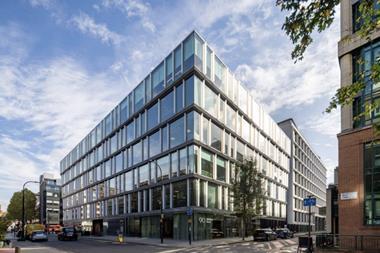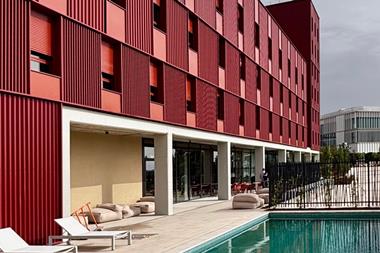As performance becomes harder to come by Dutch pension funds are focusing increasingly on manager selection - as well as a number of new areas of investment, as Richard Lowe reports
Investors have been waving goodbye to the recent era of unbridled growth across real estate markets, a time when simply gaining exposure to the asset class ensured healthy returns. And so while the process of selecting the right manager for the job has always been a hugely important one, today's uncertain environment seems to have made it all the more important for pension funds in the Netherlands.
"It was always important, of course," says Geert de Nekker, director of real estate at Cordares, which manages assets of a number of Dutch pension funds. "But the job of a manager is probably easier in an upcoming market than in a market that is going down or which is more challenging, which means that selecting the manager for the funds is increasingly important."
Robert-Jan Tel, head of real estate at TKP Investments, agrees: "When the markets become difficult, the better managers prove themselves." He explains that TKP Investments, established by the Dutch KPN and TNT pension funds and which runs the largest European property fund of funds today, has always been selective when choosing managers, but "now, of course, it is more difficult for a lot of real estate funds to raise new money," he says.
"I think in the performance you will see a bigger difference now with managers having to work really hard to get good performance - it is not just helped by the general market where everyone can make money."
Michel Schram, real estate portfolio manager at the €13bn Doctors Pension Funds Services (DPFS) sees the end of a period when effectively every manager performed well. "These are more difficult times," he says. "Now it really comes down to the manager, if he can deal with the current market and the near future. It is very important how transparent the manager is, what his acquisition powers are, etc. Those kinds of things are very important for us."
While Dutch investors are undoubtedly becoming more cautious and discriminatory in their fund selections, their appetite for new investments seems to vary greatly. For example, Schram says DPFS is no longer seeking new investments in Europe - following a high level of investment activity in 2007 - because its portfolio is now fully weighted in the region. It is therefore focusing on opportunities in Asia and the US, yet it is doing so cautiously, especially in the US, where Schram has serious concerns about "the economic situation".
He explains: "On the one hand, we are cautious, because of what might happen with the economy. Will there be enough demand for commercial real estate? Will consumers spend enough money for retail to remain in good shape?"
On the other hand, Schram sees potential opportunities arising from future distressed sellers and believes that now could be a good time in the cycle to look at building new developments. "If you are going to develop something around this time, it will be on the market in one or two years, so you can buy at the bottom of the cycle and it is finished when the market goes up again."
Conversely, Cordares is currently steering clear of the US, while in Asia and Europe it remains "business as usual", as far as de Nekker is concerned. "We are mainly investing in Europe, Asia and the US, but due to the very uncertain circumstances, new investments are not to be made in the US at this stage," he says. "We are very careful there. If there are opportunities we will look at it, but at the moment we are not very active in the US."
In Europe and Asia, Cordares is very active. "The markets are getting more unpredictable or more difficult, so we are more careful," de Nekker says. "But we are still investing and it is business as usual."
The €1bn De Eendragt pension fund, the scheme for the paper and packaging industry in the Netherlands, is looking for new investments, but not "aggressively", according to chief executive Philip Menco. "We already have a large portfolio of which a sizeable part is only committed," he says. "We may extend slightly in Europe and probably mainly in retail."
Retail seems to be one of the European sectors of choice for Dutch pension funds at the moment, not least because of its defensive qualities. "Retail is least sensitive to economic slowdown," Menco adds. "You wouldn't expect that but this is what history has told us. Of course, if you get a very serious recession then it is more vulnerable under normal circumstances, but if you don't expect that, retail is probably the best sector."
Indeed, European retail is the only sector that the €2.2bn Ahold Pension Fund is looking to expand into having spent the best part of this millennium divesting its direct Dutch holdings and working towards an 80/20 split between non-listed real estate funds and European real estate investment trusts (REITs). "The money was called up gradually and now we are more or less meeting the 80-20 asset split," Eric Huizing, director of investments at the fund says. "The only thing we want to expand is our exposure to retail."
Richard van Ovost, director of international real estate at MN Services, which manages Dutch pension fund assets, is similarly positive on the benefits of investing in retail, especially in central Europe. The asset manager has been active in the region, purchasing and redeveloping shopping centres in medium-sized cities in territories like Poland, the Czech Republic and eastern Germany.
"We will buy one or two of them in a medium-sized city and put all the effort into strengthening the shopping centre to make it the number one shopping centre for that city," Ovost explains. "That works very well. We have been doing it for two years and I am very happy with the results so far."
Geographical diversification has been one of the key themes in pension fund investment strategies in recent years, yet Edward Barker, director at Zanders Real Estate Finance, believes there is an emerging trend for Dutch investors to also diversify into alternative or niche real estate sectors.
Barker says real estate is becoming "more broadly defined" for Dutch pension funds, so that as well as investing in residential, retail and offices across geographies, they are also looking to target logistics, hotels, leisure and land investments.
"The pension funds that are more sophisticated really invest in alternative real estate," he says. "They have broadened their scope and are redefining their strategies on these alternative assets."
And Barker suggests this is a worthwhile strategy given the current environment. "The real estate markets are depressed right now," he adds. "Because of the lower returns on the normal real estate asset classes, investors are tending to look a bit beyond them to obtain a higher return."
For instance, Huizing reveals that there is an element of "sector diversification" within the European portfolio of the Ahold Pension Fund. In 2006, for example, it invested in a car parking fund.
De Nekker certainly sees an appetite for niche real estate sectors from the pension funds he works with. Car parking funds are "already becoming popular", he says and are available to investors. But not all alternative sectors are as accessible; De Nekker does not see many investment opportunities in the area of senior housing, for example. "But that is a matter of time," he suggests. "I certainly believe in such funds with a very specific focus to sit next to more general funds."
An alternative sector that is attracting interest and capital from Dutch pension funds is infrastructure. The picture is not clear cut, however, because there is an inconsistency in the way investors structure it into their overall investment portfolios.
For some, infrastructure is an alternative sector of real estate, while for others it is part of their private equity allocation. To make things even more complicated, a number of pension funds are treating it as an asset class in its own right and therefore see the need to ring-fence it from other investments.
For example, Pensioenfonds Vervoer, the €6.4bn industry-wide pension fund for the private transport sector, has outsourced the management of its real estate portfolio to ING Real Estate Investment Management, but continues to manage its infrastructure portfolio in-house. And infrastructure currently makes up 5% of the Ahold Pension Fund's alternatives allocation, which is separate from its equity, fixed income and real estate portfolios.
"Some people do consider infrastructure as private equity," Huizing says. "Others say you might consider it being real estate. Fortunately, Ahold Pension Fund also has a category which is called alternative investments. We put infrastructure into the alternative investments."
Huizing has mixed feelings about the investment opportunity offered today in the area of infrastructure, especially considering the growing proliferation of providers. "It looks interesting, especially the long-term investment horizon which really fits the needs of a pension fund being a long-term investor," he says.
"On the other hand, we see now a lot of suppliers coming to the market, so you have to be quite sure you will invest with the right team and with organisations that do have the right long-term commitments to this business."
Infrastructure is also seen as a separate mandate in DPFS's investment portfolio. Schram reveals the pension fund is currently looking for infrastructure investments, but he feels there is a need to be very selective in terms of acquisition powers, transparency and track records.
"In these times a lot of managers come with an infrastructure fund and for a lot of them it is a new business as well," he says. "We want to be in infrastructure together with managers that have a track record, know the market and know the people and the companies involved in the market and can show they have an acquisition capability."
Menco reveals that De Eendragt Pensioen has looked into infrastructure, but finds it "very expensive" at the moment. "You see tremendous fees," he says. "The big question is, of course, are the fees paid back by the extra revenues? We don't see that so far."
It was reported earlier this year in IPE Real Estate that Vervoer acted as a seed investor in a new infrastructure fund launched by Rabo Bouwfonds. "We wanted to diversify into infrastructure," Martine Menko, investment officer at the pension fund, says, explaining that when the Rabo Bouwfonds opportunity came along "we looked at it, it sounded like a good proposal and it fitted the profile we were
looking for."
Vervoer is looking at further infrastructure investments, but according to Menko the pension fund does not have "any fixed commitments or plans" to do this. "The problem is that if you look at a lot of other infrastructure funds that are being set up, the demand at the moment is higher than what is around in the market - whether the prices that one has to pay for those funds are realistic or not."
An area that could have significant implications for the way global real estate portfolios are run are property derivatives. They offer the potential to manage a global real estate portfolio much more efficiently by being able to overweight and underweight global markets synthetically. However, the real estate derivatives market is still embryonic, with the UK being the most mature market. It seems these synthetic tools are creeping on to the radar screens of Dutch pension funds.
Huizing explains that Ahold Pension Fund has been receiving a growing volume of information on the subject, but as of yet is just "monitoring what is happening". He says if there is a product that allows the pension fund to manage and rebalance its portfolio in an efficient way, "we will always take a look at it".
De Nekker confirms that real estate derivatives are on the "radar screen" at Cordares and its pension fund clients, but they are not at the stage where they would use them. "We are considering it," he reveals. "The most important thing is to understand very well how the product works and how it can add value to your total portfolio. If more and more investors are convinced of the value-added opportunity this can provide, the market will become more mature."
Barker confirms that while the derivatives market "is not there yet", he is aware that pension funds are certainly interested in its potential. "We have had some discussions with pension funds over the last two months and they are interested in the development of these markets."












